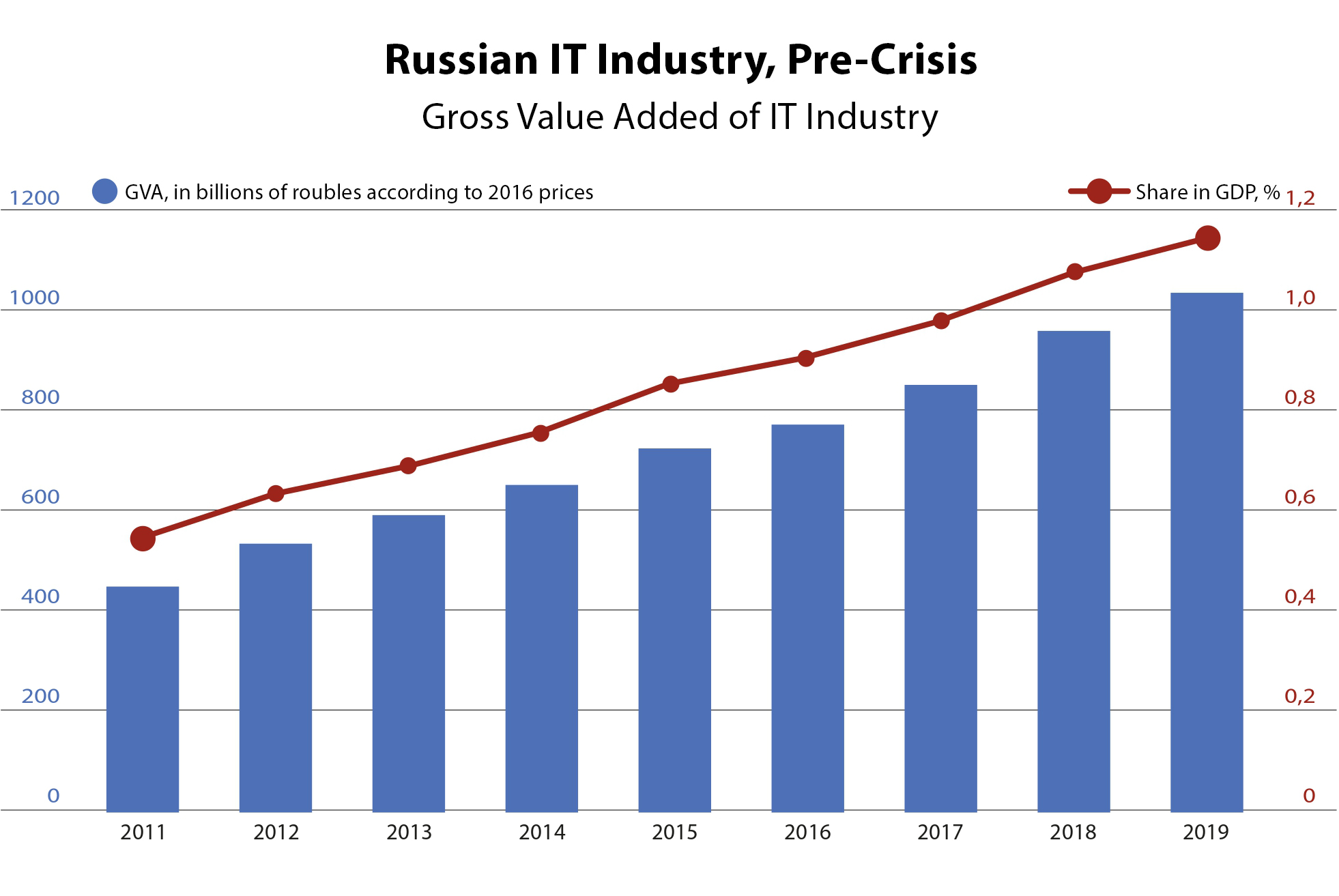Russia’s IT Industry: New Challenges and Post-Pandemic Opportunities

Alarmist forecasts have not come true: the Russian IT industry did not suffer as many losses due to the pandemic as had been expected. But the pandemic increased the need for digital products and made some old problems more acute. What should be done to accelerate the industry’s development? Participants of a seminar at HSE University attempted to answer this question.
The Centre for Structural Policy Research, the Institute for Industrial and Market Studies, and the Centre of Development Institute are launching a series of research seminars to present the results of a project by HSE University that analyses the reaction of Russia’s leading economic industries to the COVID-19 pandemic crisis. The project is implemented with the support of the Russian Union of Industrialists and Entrepreneurs (RSPP). The first seminar aimed to assess the impact of the crisis and the state’s pandemic-related policies on the IT sector.
Yuri Simachev, Director of the Centre for Structural Policy Research, emphasized the need to combine micro- and macro-research, based on market stakeholders’ surveys, in order to thoroughly study the situation in key industries. ‘It is useful to identify who has new opportunities, who is experiencing new problems, and where pre-existing problems are being made worse,’ said RSPP Vice President Maria Glukhova, adding that RSPP is working to determine what kinds of systemic support measures the industry needs.
According to Andrei Yakovlev, Director of the Institute for Industrial and Market Studies, the authors of the report presented at the first seminar used in-depth interviews with representatives of industrial associations and top executives of IT companies, which RSPP helped to organize. The study also drew upon a series of expert discussions of preliminary results.
At the beginning of the crisis, international experts were expecting a considerable decrease of IT costs: they predicted that it would take about three years to get back to the 2019 cost levels. But the massive transition to remote employment led to an increased demand for solutions for distance work and education. There was a growing need to master new channels of product sales and cybersecurity.

The pandemic brought some serious challenges to the industry and, at the same time, incentives for development; it confirmed that the IT industry is becoming a foundation for the economy’s operations, Andrei Yakovlev said. He also said that the industry experienced a serious recession in 2014-2015 due to Russia’s confrontation with the West. The recession provoked a ‘brain drain’: the limited size of the internal market and anti-Russia sanctions led to decreased salaries and limited opportunities for bringing ambitious projects to fruition, which is essential for the industry’s experts.
In addition, the dominance of the state as a commissioner of high-tech products and the role of law-enforcement bodies in regulating government contracts are hampering industry development. As a result, the industry is developing slower than it could: it generates slightly over 1% of GDP, while in the U.S. and the EU countries this share is 3% and more.
The start of the crisis saw a high level of uncertainty; there was a lot of panic, which led to cuts in IT budgets. It was assumed that the fall would amount to about one third of the market in dollar terms. But the alarmist forecasts didn’t come true. Based on the experience of 2008-2009 and 2014-2015, the companies learned to create reserves, which could be used under tough conditions, and they started being more prudent with staff reductions.
The state’s domination on the market has been an unexpected advantage during the crisis: the basic governmental decision to execute government contracts largely stabilized the IT industry
The growing use of distance technologies by public institutions and big companies preserved the demand, and the fall forecast decreased to 8% in dollar terms.
However, there are expectations of delayed market decrease due to cuts in IT budgets in public institutions in 2021, Andrei Yakovlev said.
In general, Mikhail Mishustin’s appointment as Prime Minister energized the country’s implementation of digital technology. But the state’s attitude to the IT industry remains ambivalent: the economic agencies of the government see it as a driver for the economy, while the political agencies seek to control the budget spending while not always complying with the goals of IT projects funded by the state.
In addition, the industry is experiencing a lack of qualified personnel, which was mentioned by all the respondents: companies often have to train and retrain university graduates. Meanwhile, only the biggest stakeholders can afford direct cooperation with universities.
Andrei Yakovlev believes that digital technology implementation will determine the pace of crisis overcoming and further economic development. That’s why it is important to actively get businesses involved in professional education, university education quality assessment, as well as discussions regarding admissions in industry-specific disciplines. At the same time, it makes sense to support professional education centres at IT companies, which are able to response to the market demands promptly.

Another important task, suggests Andrei Yakovlev, is to improve industry regulation, so that the risks of criminal persecution do not force professionals and executives to move abroad. This does not mean that there should be no regulations of the IT industry, but that regulators, including the involved security authorities, should be responsible for the success of the projects.
Dmitry Gavrilov, Senior Research Analyst of Cloud Services, IDC in Russia and CIS, believes that the current national economic model has no future. One of the key problems in the industry development is the lack of ‘long’ money for platform and hardware development. The current crisis has become, first of all, a result of the ‘inadequate structural reaction’ to the 2008-2009 crisis. ‘The problem is not in the money itself, but also in the structure of creditors, which is dominated by the state. In other countries, it is dominated by the private sector, which provides better conditions and flexibility,’ he said. He believes that systemic solutions and platforms should be used instead of selective support.
Nikolay Komlev, Executive Director at the Information & Computer Technologies Industry Association (APKIT), believes that the sanctions have seriously impacted the development of the IT industry: Russia’s negative reputation hinders the promotion of its software products and considerably hampers the market’s development domestically. He believes that the proper industry support policies that were introduced in January are largely cancelled out by foreign market limitations.
Mr. Komlev believes that another obstacle for development is the lack of the state’s attention to the industry opinions: the state pretends like it consults with the industry associations, but in fact, it listens more to the large state-owned companies. The government should think about the feasibility of its certain policies. ‘Forced import substitution leads only to money spending, rather than the appearance of new products and teams. We need competition. Import substitution cannot be a goal in itself,’ the APKIT Executive Director said.
According to Vladimir Salnikov, Deputy Director of the Centre for Macroeconomic Analysis and Short-term Forecasting (CMASF), the IT industry is on the threshold of fundamental change: modern technologies and platforms have become part of basic socio-economic needs, particularly for the young generation. A ‘Bill of Digital Rights’ is needed, which should prohibit governments and global companies from shutting down digital platforms and social media.
Igor Agamirzian, HSE University Vice President, professor of computer science, and former CEO of the Russian Venture Company, also thinks that import substitution of software is largely financed by big companies, which mostly remake international developments and declare them Russian products.
To promote the industry’s development, a systemic policy is needed to stimulate Russian developers and companies that create open software
‘We should pave the roads that are already being used,’ Igor Agamirzian said.
According to Prof. Agamirzian, the industry’s development was undermined by big companies’ development centres’ departure from Russia, which performed the function of competency networking. ‘We lost an important source of new knowledge and professional training,’ he said. Today, it is essential to promote international integration with software developers.
Still, Andrei Yakovlev believes, the Russian IT industry has a chance to become part of the global market: he said that the attempts to create an isolated industry ‘on an island’ are hopeless. Despite the presence of international monopolies, the world IT market remains highly competitive.
Yuri Simachev summarized the seminar and suggested to move from assessing the past and pointing fingers to forecasting the future and preparing for the new challenges. ‘It is important not to repeat past mistakes,’ the Director of the HSE Centre for Structural Policy Research concluded.
See also:
‘Two Interdisciplinary Research Centres Can Create New Synergy between Themselves’
In mid-June 2024, HSE University and the Joint Institute for Nuclear Research in Dubna held a joint working meeting. This meeting was the first under an agreement signed by the research centres in 2024, when HSE University and JINR agreed to jointly participate in experiments of the NICA megascience project, as well as interact in the field of theoretical and mathematical physics, information technology, and personnel training. These issues were the focus of the first working meeting. Details are in the JINR report.
Team of HSE University and UNN Students Wins Hackathon to Create IT Centre
A joint team of students from HSE University in Nizhny Novgorod and Lobachevsky State University of Nizhny Novgorod (UNN) won the main prize of the Smart Campus student hackathon and a certificate for 25 million roubles to create an inter-university IT centre. The award was presented by Russia’s Deputy Prime Minister Dmitry Chernyshenko.
Teaching Foreign Languages to Bill Gates and School-children in Africa
New information technologies are fundamentally changing our understanding of what education is. In his lecture at HSE, Luis von Ahn, Co-founder of reCAPTCHA and the educational platform Duolingo talked about how computer programmes teach people to interact and create new social elevators.
Parallels to Take Part in Teaching HSE Students
HSE and Parallels have agreed to cooperate on IT educational programmes. Parallels will start working with students from the HSE’s Institute of Electronics and Mathematics, and a further agreement on cooperation is to be signed with the university’s Computer Sciences Faculty.
‘The Future Growth of the World Economy is Critical for Geopolitical Decisions’
The XVI April International Academic Conference on Economic and Social Development is scheduled to take place from April 7-10, 2015, but plans are already underway among the organizers and participants alike. Recently, Dale Jorgenson, Samuel W. Morris University Professor of Economics at Harvard University, spoke with the HSE news service about his long history of cooperation with HSE. Professor Jorgenson, an internationally recognized expert on information technology and economic growth, among other subjects, shared his expectations for this year’s conference.
International Lessons in Cyber Law
HSE’s international summer school on cyber law took place for its third time this year and saw the participation of young academics from Russia, Great Britain, Italy, Germany, Slovakia, Armenia, India and a number of other countries. Invited experts included Gaetano Dimita of Queen Mary University of London, Giovanni Riccio of the University of Salerno, and David Bernstein from IBM Israel.
Yandex and the Higher School of Economics Are Opening a Faculty of Computer Science
The Higher School of Economics and Yandex are opening a Faculty of Computer Science to train specialists in Theoretical and Applied Computer Science and Software Engineering. Former director of Yandex' educational programmes, Doctor of Physics and Mathematics Ivan Arzhantsev will be the dean of the new Faculty.
Law in the Digital Era
An international conference entitled ‘Law in the Digital Era’ recently took place at the Higher School of Economics. Irina Bogdanovskaya, head of the HSE Laboratory of Information Law, told us about the results of the conference.
‘Transformation of Ontologies: theoretical foundations and software platform for complex distributed systems’ by Eduard Babkin
A book by Eduard Babkin ‘Transformation of Ontologies:theoretical foundations and software platform for complex distributed systems ’has recently been published by Lambert Academik Publishing, Koln.


